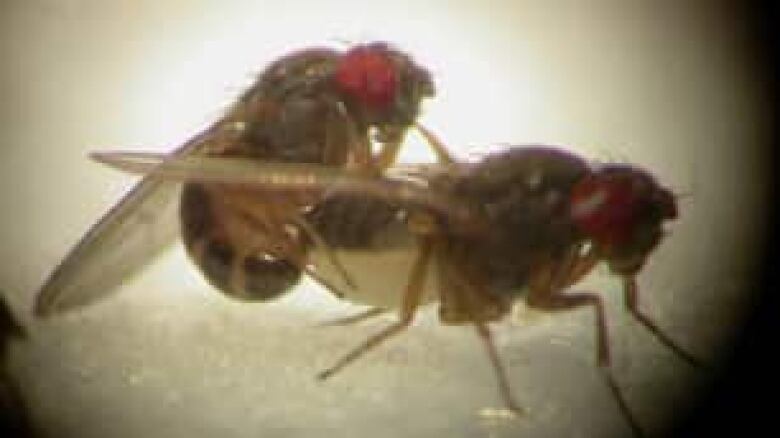Promiscuous females ensure fruit fly survival
Monogamy a dead end for fruit fly populations
Female promiscuity, the normal sexual behaviour for most animals, may be necessary for the survival ofa species, U.K. biologists say.

Researchers at the University of Exeter and the University of Liverpool studying fruit flies found that females having multiple mates reduced the risk of a population of flies going extinct.
The phenomenon of females having multiples mates, called polyandry, is the norm for most animal species, but biologists aren't sure why.
The scientists studied two groups of fruit fly populations, one that was allowed to mate naturally, wherethe females had multiple male partners, and one monogamous group, where the females were limited to one mate.
They bred the fruit flies, Drosophila pseudoobscura,for multiple generations and monitored their success.
They found that over 15 generations, five of the 12 monogamous populations of flies had gone extinct because mating resulted in all-female broods, and all the males died out.
All-female broods can result from a sex-ratio distortion gene, which causes sperm carrying Y chromosomes to disappear before fertilization.
The research, appearing this week in Current Biology, shows that female promiscuity suppressed the spread of the sex-ratio distortion gene.
Males with the gene produced only sperm carrying the X chromosome,and had half as many sperm cells as other males. When females mate with multiple partners, their eggs are more likely to be fertilized by sperm not carrying the gene, simply because there are more of them.
This limited the spread of the sex-ratio distortion gene and ensured that the all-female broods were a rarity.
Nina Wedell of the University of Exeter said the research team was surprised at how quickly the monogamous populations died out.
"Polyandry is such a widespread phenomenon in nature, but it remains something of an enigma for scientists. This study is the first to suggest that it could actually save a population from extinction," said Wedell, in a statement.












_(720p).jpg)


 OFFICIAL HD MUSIC VIDEO.jpg)
.jpg)



























































































